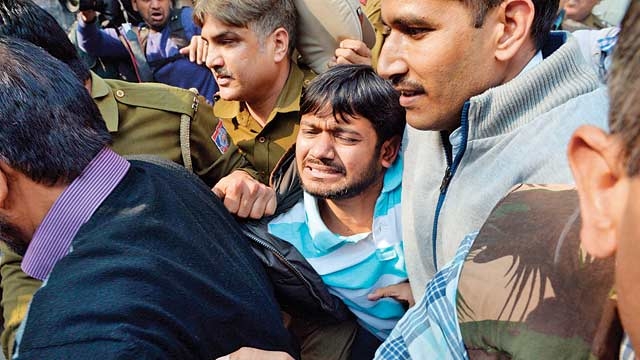Bail To Kanhaiya Kumar: Some Troubling Questions
By Shubhda Chaudhary
03 March, 2016
Countercurrents.org

JNUSU President Kanhaiya Kumar has got an interim bail for six months on 2nd March 2016, on a bail bond of ten thousand rupees.
Quite ironically, the Judge quoted ‘Bollywood song – “Mere Desh Ki Dharti Sona Ugle” in the judgement.’. She also questioned ‘this spring why colour of peace eluding prestigious JNU, needs to be answered by its students, faculty.’
The judgment reads:
As President of JNU Students Union, he will make all efforts within his power to control anti-national activities in the campus. His surety should also be either a member of the Faculty or a person related to the petitioner in a manner that he can exercise control on the petitioner not only with respect to appearance before the Court but also to ensure that his thoughts and energy are channelized in a constructive manner.
As President of Jawaharlal Nehru University Students Union, the petitioner was expected to be responsible and accountable for any antinational event organised in the campus. Freedom of speech guaranteed to the citizens of this country under the Constitution of India has enough room for every citizen to follow his own ideology or political affiliation within the framework of our Constitution.
While dealing with the bail application of the petitioner, it has to be kept in mind by all concerned that they are enjoying this freedom only because our borders are guarded by our armed and paramilitary forces. Our forces are protecting our frontiers in the most difficult terrain in the world i.e. Siachen Glacier or Rann of Kutch.
The investigation in this case is at nascent stage. The thoughts reflected in the slogans raised by some of the students of JNU who organized and participated in that programme cannot be claimed to be protected as fundamental right to freedom of speech and expression. I consider this as a kind of infection from which such students are suffering which needs to be controlled/cured before it becomes an epidemic.
Whenever some infection is spread in a limb, effort is made to cure the same by giving antibiotics orally and if that does not work, by following second line of treatment. Sometimes it may require surgical intervention also. However, if the infection results in infecting the limb to the extent that it becomes gangrene, amputation is the only treatment.
The mere fact that the bench of Justice Pratibha Rani granted conditional bail to Kumar on a bail bond of Rs 10,000 and an undertaking that “that he won’t participate in any anti-national activity”, reveals that in the eyes of the court, in spite of having no concrete evidence, Kanhaiya was still an ‘anti-national.’
It is quite surprising that it took 3 weeks for the court to grant an interim bail to Kanhaiya. Normally, an interim bail is granted for the next decided date. So, the period of six months is very peculiar to this case.
Along with the fact that it is very clear that the police has acted in a very high-handed fashion regarding the entire arrest of Kanhaiya. If you ask any distinguished laywer in the Patiala High Court, they would say that the gate through which Kanhaiya was made to enter on 17th February is not used for the accused to entry, but the police did not follow this rule. Also, the way they manhandled the case and could not prevent Kanhaiya from being assaulted by the lawyers reveals their internal politics, as they played a complicit role in the entire episode.
Sedition is a very serious and draconian charge to put on a defenseless student. But the police went ahead and charged Kanhaiya, who had not even participated on the 9th February exhibition marking the death anniversary of Afzal Guru. 3 out of the 7 videos have been doctored, as results reveal and hence, the media that had put the JNUSU president on media trial is equally culpable.
Justice has been denied in a certain sense, by delaying it. The six-month period would be treacherous for Kanhaiya because anyway, he is not a ‘free man’ and the charges against him have not been dropped off. So, he can be called for interrogation and investigation anytime, which would be mere harassment.
According to the nature of gravity of the evidence, Kanhaiya would be strong radar, a JNU Professor would have to make sure that he does not leave the campus, he does not influence or incite mob and cause violence and does not run away. Such kind of narrative straight forwardly put a kind of distrust on the victim.
Though, apart from Kanhaiya, the two other students who have surrendered, namely Umar Khalid and Anirban Bhattacharya would have to still struggle to get a bail. The mere fact that Umar, within ten days was reduced to his mere identity of being a ‘Muslim’ resurfaced and that tells us a lot about how our Indian society perceives Muslims.
In a nutshell, the 6-month bail to Kanhaiya is just to cool down the situation and nothing beyond it. This kind of judicial machinery puts a lot of pressure on students who have the right to dissent and raise voices against the government. It is preposterous and this aggressive nationalism is bound to get more vicious in the coming days.
Shubhda Chaudhary is a Phd Student at JNU. She can be reached at [email protected]

